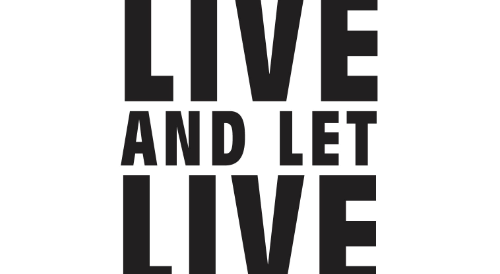Live and Let Live
Live and Let Live / 2018-10-24 / Nick Sallnow-Smith
Earlier in the summer I wrote about why, in my view, Hong Kong is neither a corporation nor a commune. It is (or should be) a community of individuals living peacefully together in our city. How, you may ask, is that different? When a Libertarian like myself talks about this, we emphasise that the individual has the primary role, not the “collective”, frequently called “society”. While most people accept that individuals should have rights, they often characterise the libertarian view as one of an atomised community of everyone for himself. They conjure up an image of 7 million lone wolves prowling Hong Kong in anarchic conditions.
Like all straw man arguments this is not what any libertarian conceives of when the idea of a community of free individuals is proposed. What do we conceive then? The answer is encapsulated in my title this month; “Live and Let Live”. Leonard Read’s synopsis of libertarian philosophy was even shorter; “Anything Peaceful”. In that phrase he wanted to capture the idea that the only need for prohibitions in a community was to prevent violence against other people and their property. Otherwise, people should be left to make their own decisions and take responsibility for own lives.
While I like Read’s formulation, I find it a little passive. Lying in bed all day is peaceful; but perhaps a little too peaceful. My phrasing is intended to emphasise that to live a fulfilling life, you need to take action; to “live”. But in enjoying the freedom to do so, in a free society we need to allow others the same freedom. Hence “live and let live”.
In the UK when I was growing up, this would have been regarded as folk wisdom: as the sort of advice every mother gave her children. Yet today, it would be regarded by many as a controversial recommendation for life. The default attitude of many of our fellow citizens is that in many walks of life (maybe even most) the government must intervene, for a variety of reasons. To “keep us safe” is one fashionable justification for intervention. To promote “equality” is the other default reason typically offered (without any reasons being offered for why equality of outcome is an ideal, rather than equality before the law) . But there is a broader underlying symptom. This has been termed by economist Thomas Sowell as the “vision of the anointed”. The subconscious assumption of many is that somehow they have been “anointed” to take decisions that will be beneficial for others, because their own blueprint for the community is obviously better than that of other people.
Let’s take a current example in Hong Kong; the CE’s proposal to outlaw “vaping”. The reaction from commentators in the media, both here and abroad, typically centres on the technical details. Is vaping “safer” than smoking? Does the damage from tobacco come from the tar, not the nicotine? Might it lead to youngsters moving on to cigarettes later? Shouldn’t we have years of testing to establish whether it is “harmful”. (No doubt there will be many arguments about what “harmful” means in this context.) And so on.
What none of this does is apply the social test of my title. Why not live and let live? If someone wants to vape, what basis is there in a truly free society for stopping them? Many will argue that “we” (who is that group?) should protect the “vapers” from themselves. But it is none of the business of anyone to “protect” other citizens from their own decisions. I possess my own body (otherwise I am a slave), why therefore should I not be free to inhale anything into my body that I choose? It is the height of arrogance for anyone to claim that their own judgment about whether vaping is a “good thing” or not, is a superior judgment to that of the person they are, in effect, judging. Yet few people discuss the matter in “live and let live” terms, rather they are keen to explain why they are in favour or against the ban, without even considering whether it is anyone’s business except the”vaper”.
In fact the vaping debate is even worse than that. The proposal has naturally triggered some eager souls to claim that smoking tobacco should also be banned, because obviously tobacco smoke is more harmful than vaping. In other words, the vaping proposal did not so much trigger a debate about whether government bans too much, rather people look for more activities to make illegal! This is often the consequence of a highly regulated society. Few resist the existing level of regulations; most people simply argue for more. Assuming the position of the “anointed”, they propose that any set of activities that they happen to dislike in others should be banned (for the benefit of others of course). The list of activities ripe for regulation is endless.
One great benefit of a “live and let live” approach (which Hong Kong used to enjoy), apart from the personal freedom that it would allow, is that it would neutralise ( “vapourise”?) much of the political dissension in our city. So many political issues arise from one “anointed” group attempting to impose their policy ideas on the rest of us. Whether this involves the public school curriculum, regulating cyber currencies, imposing a minimum wage, forcing property owners to sell what they do not wish to do so; to select just a few of recent debate, the inevitable consequence of denying free market choices in any of these areas is political infighting over which “policy” is to be imposed, when in fact no policy is needed.
I suggest that all of us, when hearing of yet another “public policy” proposal, apply the following test; why not “live and let live”?
Nick Sallnow-Smith
Chairman

